teaser
Primary prophylaxis, the standard treatment to prevent bleeding episodes in children with haemophilia A, is also effective for adolescents and adults, according to research published in the Journal of Thrombosis and Haemostasis.
The preventive therapy will “optimise care for haemophilia patients of all ages by stopping unexpected bleeding events that can have a detrimental impact on the lives of patients,” said lead author Dr. Leonard Valentino, Director of the Rush Haemophilia and Thrombophilia Centre.
The study was conducted as part of a comprehensive clinical study of ADVATE Anti-haemophilic Factor (Recombinant), Plasma/Albumin Free Method (rAHF-PFM) to compare the effectiveness of two prophylactic treatment regimens, as well as between on-demand and prophylaxis treatments, in preventing bleeding in previously treated patients with severe or moderately severe haemophilia A.
In people with haemophilia A, clotting factor VIII is either absent or present at low levels.
Factor VIII replacement, such as rAHF-PFM, is considered the treatment of choice for managing haemophilia A patients who lack inhibitors of factor VIII.
About 90% of people who have haemophilia have type A. Of these, 70% have the severe form of the disorder, indicated by a factor VIII level of less than 1% of normal.
Primary prophylaxis is already the standard of care for children with haemophilia A.
It is believed that the early initiation of prophylaxis may confer a protective effect against factor VIII inhibitor, the most serious complication associated with replacement therapy.
Adult haemophilia patients are treated either in response to bleeding (on demand) or with regular infusion of clotting factor to prevent bleeding and further joint damage.
However, while on-demand treatment can slow the progression of haemophilia-related arthritis, it does not seem to prevent the condition.
In the study, one regimen was based on common practice with every-other-day dosing.
The other was customised for each individual based on the drug’s activity in the body (pharmacokinetics, or PK) with every-third-day dosing.

PK-tailored prophylaxis offers an alternative to standard prophylaxis for the prevention of bleeding.
Study participants aged 7 to 65 years received six months of on-demand treatment with dosing dependent on the severity and type of bleeding episode.
After completing the on-demand treatment period, subjects were randomised to receive 12 months of either standard or PK-tailored prophylaxis treatment.
Once the prophylaxis period began, factor VIII levels were assessed every three months.
Of the 66 subjects in the study, 22 (33.3%) who received prophylaxis had no bleeding episodes, in contrast to the patients treated on demand.
No subject developed factor VIII inhibitors. The patients who achieved these results were adherent to the prescribed number of prophylactic infusions.
Compared with on-demand treatment, both prophylaxis regimens significantly reduced bleeding, including spontaneous and traumatic haemorrhaging, and improved the quality of life for adolescent and adults patients.
Results of the study suggest that prophylaxis is the optimal treatment for patients with severe haemophilia.
Data from the study also confirm and extend the safety and effectiveness of rAHF-PFM for controlling and preventing bleeding in the management of haemophilia A.
The study findings suggest that the PK-tailored prophylaxis regimen, which used similar amounts of rAHF-PFM and one fewer infusion per week, is a viable treatment alternative to standard prophylaxis.
The availability of this option could increase treatment adherence, particularly in children and adolescents, for whom compliance with long-term medical regimens is especially challenging.
Additionally, the study confirms and extends the safety and effectiveness of rAHF-PFM for controlling and preventing bleeding in the management of haemophilia A.
Journal of Thrombosis and Haemostasis
